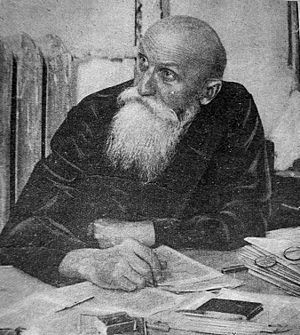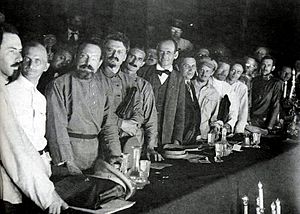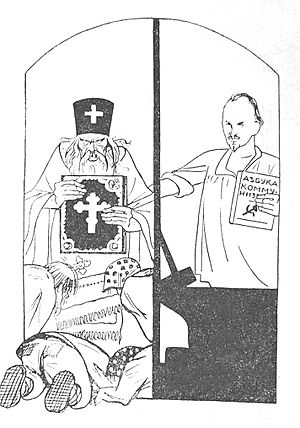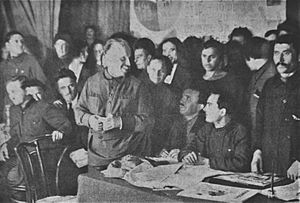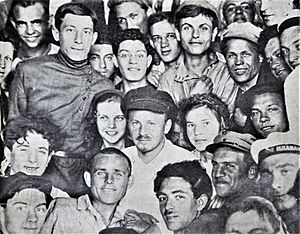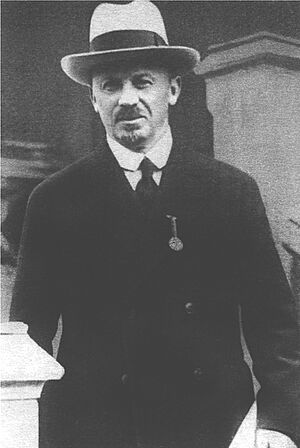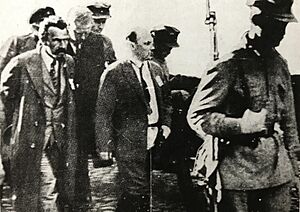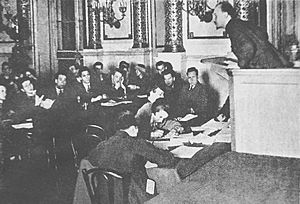Nikolai Bukharin facts for kids
Quick facts for kids
Nikolai Bukharin
|
|
|---|---|
|
Никола́й Буха́рин
|
|
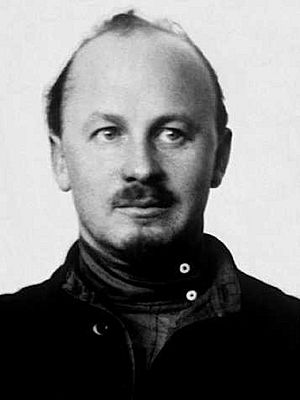
Bukharin in 1930
|
|
|
|
| In office November 1926 – April 1929 |
|
| Preceded by | Grigori Zinoviev |
| Succeeded by | Vyacheslav Molotov |
| Editor-in-chief of Pravda | |
| In office November 1918 – April 1929 |
|
| Preceded by | Joseph Stalin |
| Succeeded by | Mikhail Olminsky |
| Full member of the 13th, 14th, 15th Politburo | |
| In office 2 June 1924 – 17 November 1929 |
|
| Candidate member of the 8th, 9th, 10th, 11th, 12th Politburo | |
| In office 8 March 1919 – 2 June 1924 |
|
| Personal details | |
| Born |
Nikolai Ivanovich Bukharin
9 October 1888 Moscow, Russian Empire |
| Died | 15 March 1938 (aged 49) Moscow, Russian SFSR, Soviet Union |
| Cause of death | Execution by firing squad |
| Resting place | Kommunarka shooting ground |
| Nationality | Russian |
| Political party |
|
| Spouses |
|
| Children | 2 |
| Alma mater | Imperial Moscow University (1911) |
| Known for | Editor of Pravda and Izvestia, author of The Politics and Economics of the Transition Period, Imperialism and World Economy, co-author of The ABC of Communism, principal framer of the Soviet Constitution of 1936 |
Nikolai Ivanovich Bukharin (Russian: Никола́й Ива́нович Буха́рин) (October 9, 1888 – March 15, 1938) was an important Bolshevik revolutionary, Soviet politician, and writer. He wrote many books about political ideas and economics.
Bukharin became involved in politics at age sixteen. He joined the Russian Social Democratic Labour Party in 1906. As a young man, he lived in exile for six years, working closely with other revolutionaries like Vladimir Lenin and Leon Trotsky. After the revolution of February 1917, he returned to Moscow. He quickly rose in the party and became the editor of their main newspaper, Pravda, after the October Revolution.
Inside the Bolshevik Party, Bukharin first held "left communist" views. But from 1921, he slowly moved towards more moderate ideas. He strongly supported the New Economic Policy (NEP), which helped him become a leader of the "Right Opposition." By late 1924, Bukharin became a key ally of Joseph Stalin. He helped develop Stalin's idea of "Socialism in One Country." From 1926 to 1929, Bukharin was very powerful as the General Secretary of the Comintern's executive committee. However, Stalin's decision to force farmers to join large collective farms (called collectivisation) caused a split between them. Bukharin was removed from the Politburo in 1929.
When a period of widespread arrests and trials, known as the Great Purge, began in 1936, some of Bukharin's private talks suggested he was disloyal. He was arrested in February 1937. Bukharin was accused of serious crimes against the Soviet government. After a public trial where the outcome was often decided beforehand, he was put to death in March 1938.
Early Life and Political Beginnings (Before 1917)
Nikolai Bukharin was born on October 9, 1888, in Moscow. His parents, Ivan Gavrilovich Bukharin and Liubov Ivanovna Bukharina, were both schoolteachers. Nikolai said his father did not believe in God and often asked him to read poetry to family friends, even when he was very young. His childhood stories are told in his book How It All Began.
Bukharin's political journey started when he was sixteen. He and his friend Ilya Ehrenburg took part in student activities at Moscow University related to the Russian Revolution of 1905. In 1906, he joined the Russian Social Democratic Labour Party and became part of the Bolshevik group. With Grigori Sokolnikov, Bukharin helped organize a national youth conference in Moscow in 1907. This meeting is now seen as the start of the Komsomol, a youth organization.
By the time he was twenty, Bukharin was a member of the Moscow Committee of the party. This committee had many spies from the Tsarist secret police, called the Okhrana. As a leader, Bukharin quickly became a target for them. He also met his first wife, Nadezhda Mikhailovna Lukina, who was his cousin and also a party member. They got married in 1911 after returning from being sent away from Moscow.
In 1911, Bukharin was briefly jailed and then sent away to Onega. But he soon escaped to Hanover, Germany. He stayed in Germany for a year before going to Kraków in 1912 to meet Vladimir Lenin for the first time. During his time away, he kept studying and wrote several books. These books made him an important Bolshevik thinker in his twenties. His book Imperialism and World Economy influenced Lenin's own famous work, Imperialism, the Highest Stage of Capitalism.
Role in the Russian Revolution (1917-1923)
When news of the Russian Revolution broke in February 1917, revolutionaries living in other countries started returning home. Bukharin left New York in early April and arrived in Moscow in May 1917. At first, the Bolsheviks were a small group in Moscow. But as more people liked Lenin's promise to end World War I, the number of Bolshevik members grew a lot.
Bukharin became a member of the Central Committee in October 1917. This showed how important the Moscow Bolsheviks had become. By September 1917, the Bolsheviks were the largest group in Moscow.
During the October Revolution, Bukharin was a key leader in Moscow. He wrote and defended the new rules of the Moscow Soviet (a local council). After the revolution, Bukharin became the editor of Pravda, the party's newspaper.
Bukharin strongly believed in a worldwide revolution. Near the end of World War I, when Russia was thinking about making peace, he wanted the war to continue. He hoped it would cause workers in other countries to rise up. He was also against working with capitalist countries.
Bukharin led the "Left Communists" who strongly opposed Lenin's decision to sign the Treaty of Brest-Litovsk. This treaty ended Russia's involvement in World War I but gave up a lot of Russian land. Bukharin later said that this time was "a period when the party stood a hair from a split."
After the treaty was approved, Bukharin went back to his party duties. In March 1919, he joined the Comintern's executive committee. During the Russian Civil War, he wrote several books about economics. These included the popular guide The ABC of Communism (with Yevgeni Preobrazhensky, 1919) and Historical Materialism (1921).
By 1921, Bukharin changed his mind. He agreed with Lenin that the Soviet state needed to survive and grow to support future world revolutions. He became the main supporter of the New Economic Policy (NEP). This policy allowed some private businesses and capitalism in farming and trade, while the state kept control of big industries. Some "left communists" saw this as a step back from socialist ideas.
Rise and Fall from Power
After Lenin passed away in 1924, Bukharin became a full member of the Politburo, a top decision-making body. In the struggle for power that followed, Bukharin teamed up with Joseph Stalin. Stalin presented himself as a moderate leader and supported the NEP. Bukharin helped Stalin develop the idea of "Socialism in One Country." This idea suggested that socialism could be built in one country, even if it was not fully developed, without needing revolutions everywhere else. This became a key part of Stalin's policies.
Stalin and Bukharin worked together to remove other powerful leaders like Grigory Zinoviev and Lev Kamenev. From 1926 to 1928, Bukharin had a lot of power. He led the "right wing" of the party and became General Secretary of the Comintern's executive committee in 1926. However, in 1928, there was a shortage of grain. Stalin then changed his mind and pushed for fast industrialization and forced collectivization of farms. He believed the NEP was not working fast enough.
Bukharin was worried about Stalin's new plan. He feared it would hurt farmers. Bukharin wanted the Soviet Union to industrialize, but he preferred a slower approach. He believed that if peasants were allowed to become successful, they would produce more grain to sell. Bukharin argued his views throughout 1928, saying that forcing farmers to give up their grain would not work.
Losing Influence
Bukharin's support for the NEP was not popular with many higher-ranking party members. His advice to peasants, "Enrich yourselves!", and his idea of reaching socialism "at a snail's pace" made him an easy target. Stalin attacked Bukharin's ideas, saying they were too capitalist and that the revolution was at risk without fast industrialization.
Bukharin had helped Stalin gain power, but now Stalin easily outsmarted him. Bukharin tried to keep the appearance of unity within the party. Meanwhile, Stalin used his control over the party to replace Bukharin's supporters in Moscow and other important groups. Bukharin tried to get support from former rivals like Kamenev and Zinoviev. Details of his private meetings were leaked, leading to accusations against him. Eventually, Bukharin lost his position in the Comintern and as editor of Pravda in April 1929. He was removed from the Politburo on November 17, 1929.
Bukharin was forced to say he was wrong. He wrote letters to Stalin asking for forgiveness. But Stalin knew Bukharin's apologies were not sincere because he had listened to Bukharin's private conversations.
Later Work and Arrest
Even after losing power, Bukharin still did important work for the party. For example, he helped write the 1936 Soviet constitution. Bukharin believed this constitution would bring real democracy. Some evidence suggests Bukharin hoped for more open elections.
In 1934, Bukharin was politically restored and became editor of Izvestia, another newspaper. There, he often warned about the dangers of fascist governments in Europe. He also invited the famous poet Boris Pasternak to contribute to the newspaper. Pasternak described Bukharin as "a wonderful, historically extraordinary man."
Bukharin had also helped another poet, Osip Mandelstam, since 1922. Mandelstam's wife said that Bukharin helped her husband with many things, including getting his poetry published and finding an apartment. Bukharin even wrote to Stalin and spoke to the head of the secret police, Genrikh Yagoda, to ask for Mandelstam's release after he was arrested.
However, a key event changed everything: Sergey Kirov, a party leader, was killed in December 1934. Stalin used Kirov's death as an excuse to start the Great Purge. During this time, about 700,000 people were killed as Stalin removed anyone who might oppose him.
The Trial and Execution
In February 1936, Bukharin was sent to Paris by Stalin to buy old writings of Marx and Engels. He was joined by his young wife, Anna Larina. He could have stayed in exile, but he decided to return to the Soviet Union, saying he could not live outside his homeland.
During this trip, Bukharin spoke to old friends and shared his true thoughts about Stalin and his policies. He talked about the terrible things that happened during forced collectivization, where many innocent people were killed. He said that party members involved in these actions became "cogs in a terrible machine," losing their humanity.
Stalin was unsure about arresting Bukharin for a while. But after other leaders were tried and executed in 1936, Bukharin and Alexei Rykov were arrested on February 27, 1937. They were accused of trying to overthrow the Soviet government.
Bukharin was put on trial in the "Trial of the Twenty One" from March 2-13, 1938. This was part of the Great Purge. The accusations were very extreme. It was claimed that Bukharin and others had tried to kill Lenin and Stalin, poisoned a famous writer, and planned to divide the Soviet Union.
Many people outside the Soviet Union were shocked by Bukharin's trial. The accusations seemed absurd, and the purge was affecting almost every important old Bolshevik leader except Stalin. For some communists, this trial made them completely break away from communism.
While some claimed Bukharin was not tortured, it is known that his questioners were allowed to use "beating permitted" methods. Bukharin resisted for three months. But threats to his young wife and baby son, combined with physical pressure, wore him down. When he saw his confession, which Stalin had personally changed, he took back his entire confession. The questioning started again with more interrogators.
Bukharin's confession and his reasons for it have been much discussed. Some believe he was making a final sacrifice for the party, while others think he was subtly trying to expose Stalin's actions. His letters to Stalin showed deep sadness and pleas of innocence, but his behavior in court was different. He admitted to "the sum total of crimes" but denied specific ones. He even said that "the confession of the accused is not essential," which was a strong statement in a trial based only on confessions.
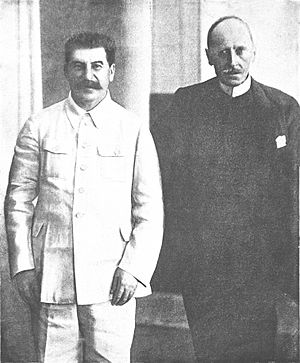
The prosecutor, Andrey Vyshinsky, called Bukharin a "crossbreed of fox and pig" who committed "vile crimes."
While in prison, Bukharin wrote at least four books. These included an autobiographical novel, How It All Began, a philosophical book, Philosophical Arabesques, and a collection of poems. These were found in Stalin's archives and published in the 1990s.
Bukharin was put to death on March 15, 1938, at the Kommunarka shooting ground. The news of his death was overshadowed by Nazi Germany taking over Austria.
Despite promises to protect his family, Bukharin's wife, Anna Larina, was sent to a labor camp. She survived and saw her husband officially cleared of charges by the Soviet state in 1988. Their son, Yuri Larin, born in 1936, was sent to an orphanage to keep him safe and also lived to see his father cleared. Bukharin's first wife, Nadezhda, died in a labor camp. His second wife, Esfir' Gurvich, and their daughter Svetlana, were arrested in 1949 but also survived.
Legacy and Contributions
Bukharin was very popular within the party, even after he lost power. In his last will, Lenin called him the "Golden Boy" of the party. Lenin wrote that Bukharin was a "most valuable and major theorist" and "the favourite of the whole Party."
Bukharin made several important contributions to Marxist–Leninist ideas. His notable works include The Economics of the Transition Period (1920) and his prison writings, Philosophical Arabesques. He was also a founding member of the Soviet Academy of Arts and Sciences and was interested in botany. His main contributions to economics were his ideas on imperialism and how to move towards communism in the Soviet Union.
His ideas, especially about economics and "market socialism," later influenced China's economic reforms under Deng Xiaoping.
The British author Martin Amis said that Bukharin might have been the only major Bolshevik to show "moral hesitation." He questioned the violence and big changes of the early Soviet Union. Amis wrote that Bukharin said he had seen "things that I would not want even my enemies to see" during the Civil War.
Writings
Books and Articles
- 1917: Imperialism and World Economy
- 1919: Economic Theory of the Leisure Class
- 1920: The ABC of Communism (with Evgenii Preobrazhensky)
- 1921: Historical Materialism: A System of Sociology
- 1929: Notes of an Economist
- 1937–1938: How It All Began, an autobiographical novel, first published in English in 1998.
Cartoons
Bukharin was also a cartoonist. He drew many cartoons of Soviet politicians of his time. A famous artist once told him: "Forget about politics. Painting is your real calling." His cartoons are sometimes used in books about Soviet officials. One historian said that Bukharin's drawings of Joseph Stalin were the only ones made from real life, not from photographs.
Images for kids
-
Kliment Voroshilov, Semyon Budyonny, Mikhail Frunze and Nikolai Bukharin in Novomoskovsk 1921 with the 1st Cavalry Army (Konarmia)
See also
 In Spanish: Nikolái Bujarin para niños
In Spanish: Nikolái Bujarin para niños
 | Shirley Ann Jackson |
 | Garett Morgan |
 | J. Ernest Wilkins Jr. |
 | Elijah McCoy |


